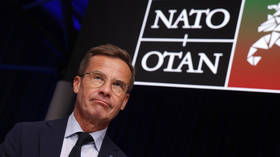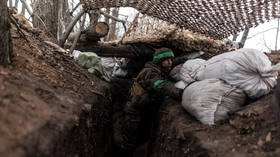NATO, church & brotherhood of arms: Vladimir Putin visits Belgrade
Russian President Vladimir Putin got a hero’s welcome in Belgrade. The one-day visit to the last holdout against NATO’s ambitions in the Balkans may have been somewhat short on substance, but was certainly loaded with symbolism.
Even before he landed, the Russian leader was given an honor guard by Serbian air force MiGs, a 2017 gift from Moscow to replace those destroyed by NATO during the 1999 air campaign that ended with the occupation of Serbia’s province of Kosovo. Russia has refused to recognize Kosovo’s US-backed declaration of independence, while the US and EU have insisted on it.
Upon landing, Putin began his first official trip of 2019 by paying respects to the Soviet soldiers who died liberating Belgrade from Nazi occupation in 1944. While most Serbians haven’t forgotten their historical brotherhood in arms with Russia, it did not hurt to remind the West just who did the bulk of the fighting against Nazi Germany back in World War II.
Also on rt.com Putin takes Serbian president for a ride in his Russian-made Aurus limousine (VIDEO)
After official talks with Serbian President Aleksandar Vucic, Putin visited the Church of St. Sava, the grand Orthodox basilica set on the spot where the Ottoman Turks torched the remains of the first Serbian archbishop back in 1594, in an effort to maintain power.
Sava, whose brother Stefan became the “first-crowned” king of medieval Serbia, was responsible for setting up the autocephalous Serbian Orthodox Church exactly eight centuries ago this year. For all its own troubles, the Serbian Church has sided with Moscow in the current Orthodox schism over Ukraine.
Russian artisans have been working on the grand mosaic inside the basilica, and asked Putin to complete the design by placing the last three pieces, in the colors of the Russian flag.
Путин завершил мозаику Христа в Храме святого Саввы: Впечатал три мозаичных камня в цветах флага России pic.twitter.com/fCIs7ZaZcR
— Дмитрий Смирнов (@dimsmirnov175) January 17, 2019
Whether by sheer coincidence or by design, Putin also weighed in on Serbia’s culture war, giving interviews ahead of his visit to two daily newspapers that still publish in Serbian Cyrillic – while the majority of the press, whether controlled by the West or by Vucic, prefers the Latin variant imported from Croatia.
Western media usually refer to Serbia as a “Russian ally.” While this is true in a historical and cultural sense, there is no formal military alliance between Moscow and Belgrade. Serbia officially follows the policy of military neutrality, with its armed forces taking part in exercises alongside both Russian and NATO troops.
This is a major source of irritation for NATO, which seeks dominion over the entire Balkans region. Most recently, the alliance extended membership to Montenegro in 2017 without putting the question to a referendum. It is widely expected that “Northern Macedonia” would get an invitation to NATO as soon as its name change process is complete – and that was arranged by a deal both Macedonia and Greece seem to have been pressured into by Washington.
Also on rt.com ‘He’s cute!’: Serbian president gifts Putin fierce and loyal Balkan sheepdog
That would leave only Serbia outside the alliance – partly, anyway, since NATO has a massive military base in the disputed province of Kosovo, and basically enjoys special status in that quasi-state. Yet despite Belgrade’s repeated declarations of Serbia wanting to join the EU, Brussels and Washington have set recognition of Kosovo as the key precondition – and no Serbian leader has been able to deliver on that just yet, though Vucic has certainly tried.
Putin’s repeated condemnations of NATO’s 1999 attack, and Russian support for Serbia’s territorial integrity guaranteed by the UN Security Council Resolution 1244, have made him genuinely popular among the Serbs, more so than Vucic himself. Tens of thousands of people showed up in Belgrade to greet the Russian president.
While Vucic’s critics have alleged that many of them were bused in by the government – which may well be true, complete with signs showing both Vucic and Putin – there is no denying the strong pro-Russian sentiment in Serbia, no matter how hard Integrity Initiative operatives have tried.
The Serbs are happy to welcome Putin, even after all of Europe has been under the influence of a major campaign against Russia, which has been partly financed by UK.
The Serbs seem to be immune to propaganda against Russia.#IntegrityInitiative has failed here.



